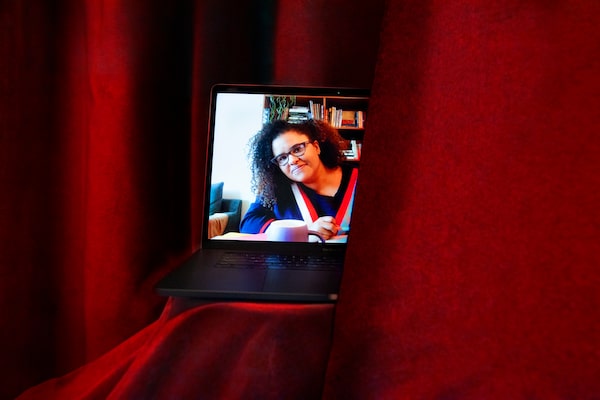
Leah-Simone Bowen, photographed remotely from her Toronto home, was supposed to start rehearsals in April on a production of Scott Joplin’s opera Treemonisha.Photography by Bronwen Sharp/The Globe and Mail/The Globe and Mail
Leah-Simone Bowen
The world-premiere reimagining of Scott Joplin’s opera Treemonisha, presented in California by Stanford Live and produced by Toronto’s Volcano Theatre in association with the collective Moveable Beast, was set for April. Part of a creative team of predominantly Black women, the Alberta-born librettist and broadcaster had toiled on the reworked story for six years. Three days before first rehearsals, the project was shelved.
This is a show, and life goes on. But it’s been a wild ride. It was an enormous project, not only for me as the writer and doing the adaptation, but there are [a] number of companies and co-commissioners involved, from Volcano Theatre and Moveable Beast to Stanford Live to the Banff Centre and the National Arts Centre. It was such a Herculean effort to get to this point in the first place. That’s why it’s so shattering right now. Everyone is being positive. But I’ll be honest – I don’t know how it’s going to get going again.
When this adaptation of Treemonisha was pitched at the International Society for the Performing Arts in New York, there was a lot of interest in a work led by Black women. And then Volcano pushed a large boulder up a hill to try to get it to a place where it was ready to be produced. It just feels so bizarre to see something disappear right in front of you. The work we’ve done has been archived. Maybe something will happen with it, but maybe it never will. That’s the way I have to look at it. You just have to keep moving forward and tell the next story. In the end, we’re seeing what really matters right now. It’s health. It’s shelter. It’s food. So, we’ll focus on those things, and hopefully we’ll come back to Treemonisha when we can all be in a room together.
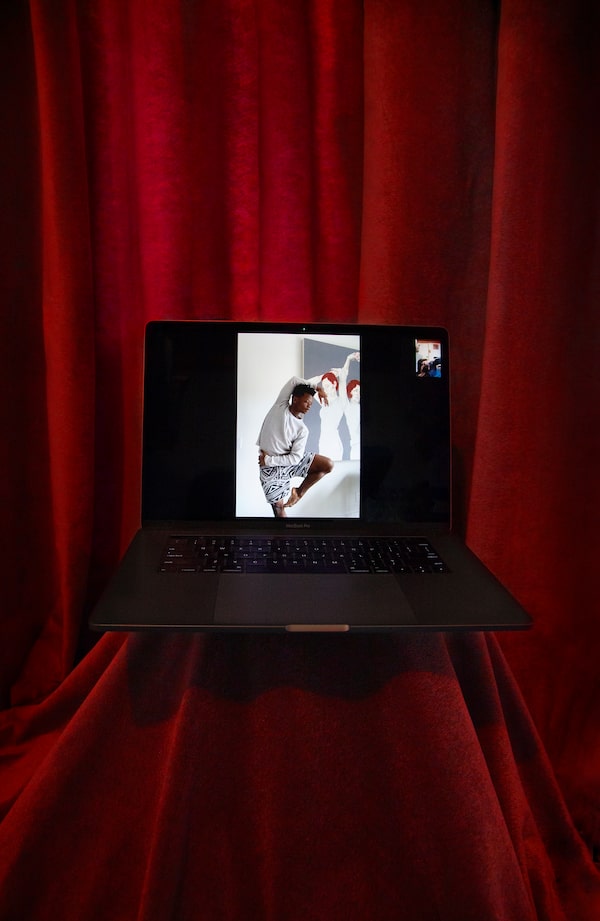
Sipheihle November of the National Ballet of Canada was supposed to be preparing for productions of Romeo & Juliet and Swan Lake.
Siphesihle November
As the youngest of five children who grew up poor in a rural South African township, the story of the dancer they call Siphe is somewhere between Billy Elliot and Cinderella. He came to Canada in 2010 on a scholarship to study at the Canadian National Ballet School, then joined the National Ballet in 2017, where he was recently promoted to second soloist. But after just three performances last month, the National Ballet halted its production of Romeo & Juliet, with Siphe in the role of Benvolio. And with the postponement of Karen Kain’s new production of Swan Lake this summer, the 21-year-old dancer finds himself in mid-jump with no place to land.
The three performances we did of Romeo & Juliet were amazing, but we knew its cancellation was coming. I have friends dancing in Europe, so I knew what was happening. It was a dark cloud coming our way. I miss being with the other dancers. We’d start the day together in the same room. It was home. Though it’s a weird time for everybody, it’s especially strange when it’s your job to turn and jump and run and eat up space and be physical. And now you can’t do it. I can’t properly work out in my apartment.
We were supposed to be preparing for Swan Lake after Romeo & Juliet. We’re trying to maintain a routine online. Among other things, it’s about keeping the culture of family together. That kind of camaraderie is why I love the National Ballet of Canada.
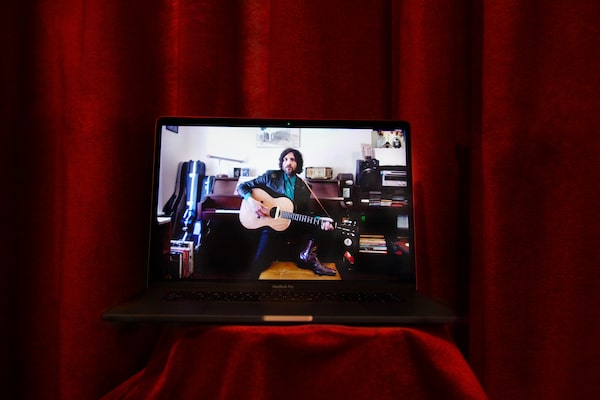
Jerry Leger's European tour was cancelled as COVID-19 closed international travel and public performances around the world.
Jerry Leger
After 15 years of modest success, the Americana-rocker from Toronto finally looked ready to break out with the release of his new album, Time Out For Tomorrow, which earned positive reviews in the mainstream music press. But his coming European tour was cancelled because of the COVID-19 pandemic, putting a pause on a late-blooming career.
My 2017 album Nonsense and Heartache started getting me some widespread attention, especially overseas. I was able to quit my part-time job at a hardware store. The touring picked up, and I was making enough money on music alone to keep the lights on. There was more anticipation than ever for my new album. I had a feature and then a review in Uncut magazine, which I’ve been a fan of since I was 12 years old. There was a sense of momentum building. Ticket sales for my spring tour of Europe and the U.K. were going great. The rooms were getting bigger.
So, this was a blow. It was a huge disappointment not to play for people who were excited by the new record. Nobody is buying albums any more.
For musicians like me, and crews and everyone else, live music is all we had left. But here we are. This is historic. Everyone is being affected, not just musicians. But for me, since you asked, career-wise and financially, this has been devastating.
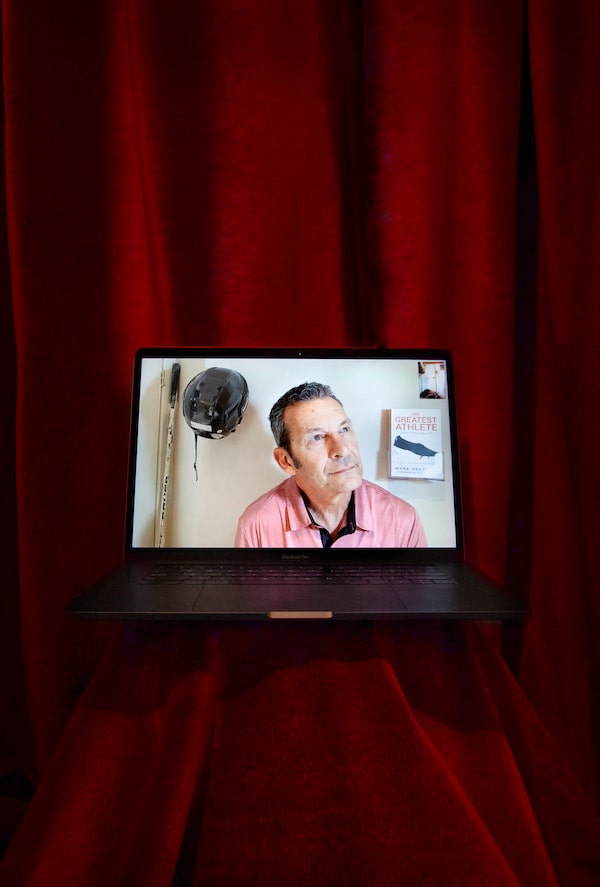
Mark Hebscher bought hundreds of copies of his debut book, The Greatest Athlete, before the pandemic cancelled his tour to promote it.
Mark Hebscher
The first-time author and former sportscaster wrote a book on a Canadian athlete most of us have never heard of – and now many people never will. Hebscher’s The Greatest Athlete unearths the fascinating life and times of George Washington Orton, a turn-of-the-century Olympic gold-medal runner, sports pioneer and scholar. A scheduled book tour would have brought Orton’s story to light – but those engagements have all been cancelled, taking Hebscher’s expected income with them.
In support of my book, I had a string of speaking engagements lined up. I was also going to Philadelphia to promote the book at the Penn Relays track and field event. I bought hundreds of books at the 50-per-cent-off author’s rate from my publisher, Dundurn, to sell. And then, one by one – cancelled, cancelled, cancelled. Now I have all these books. I pretty much had all my eggs in one basket. They want me to reschedule for 2021, which is great. But I was kind of hoping for that money in 2020. Before all this, I could look at a calendar and know which days were money days for me – a speaking engagement, a book reading. Now they’re gone.
Those were my opportunities to get out there and promote myself for future business. I do voice-over work. I have a podcast, Hebsy on Sports. Every time you sell a book to someone, you’ve got a friend there. You’ve made a connection. But it’s all gone by the wayside now.

Composer Kevin Lau's opera BOUND, which was set to debut this month, is now indefinitely postponed.
Kevin Lau
“Postponed indefinitely” are just about the last two words any creator wants to hear. The world premiere of the Toronto composer’s new opera, BOUND, with Toronto’s Against the Grain company, was set for this month. The production, which went from concept to realization in three years, explores the world’s refugee crisis and the current state of those displaced, dehumanized and mistreated.
The postponement of BOUND is a little bit heartbreaking. It’s the first opera by Against the Grain using an original score. My involvement with the project was front-loaded, so for me, I’m disappointed not to see all the new elements come together. We had a new music director, a new stage director and a transgender character being played by an actual transgender actor.
This is an opera about characters in physical and emotional isolation. They’re imprisoned on the grounds of their identity. It’s a different situation than what’s happening with COVID-19, but the outcome is eerily similar to what we’re all going through right now. We’re all in this moment of collective sacrifice. That realization doesn’t make the loss of BOUND less painful, but it’s absolutely something I can understand and deal with.
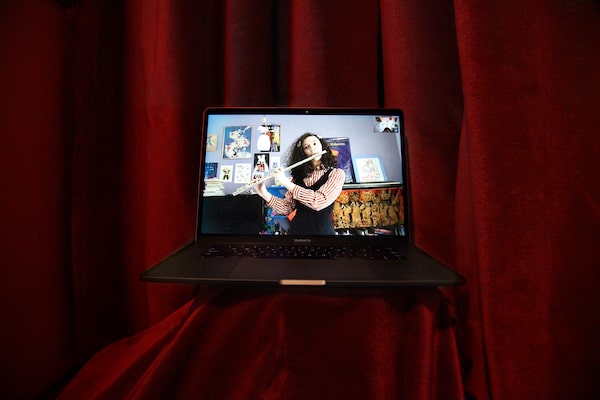
Alex Masse plays the flute from her home in Surrey, B.C. A mentorship program in May would have included her first real gig.
Alex Masse
Masse, 19, lives in Surrey, B.C., where she writes music, poetry and fiction, and plays the flute. While volunteering at Vancouver’s Queer Arts Festival, she heard about a program offering an artistic mentorship and a spot onstage at the Ignite! Youth Festival at The Cultch in May (the event would’ve featured 85 young performers over five nights, plus 10 gallery artists, crew members and other creators). It would’ve been Masse’s first real gig, aside from playing the flute in her tutor’s band at a local apple festival.
On a whim in January, I sent in an application for this mentorship that would have paid me $500 and got me onstage at Ignite!, which draws a few hundred people in the audience, which for me is big. I know on a grand scale of things it’s not a big break, but I was hanging out with people who do poetry for a living, and that was so cool for me – all these incredible people I never thought I’d be in a room with. It also would’ve been the first time I was doing something by myself and getting paid more than, like, a little bit. I was so excited to be on a stage and be myself for the first time – not like, you know, backup flautist No. 3. I was working on what I wanted to do on stage. It was all becoming tangible. I was kind of like, ‘Wow this is really happening.’"
Initially, people were saying the festival was postponed indefinitely, and then my mentor said it was gone. Not postponed, not moved, just gone. And I remember thinking, Oh my God – there goes that.
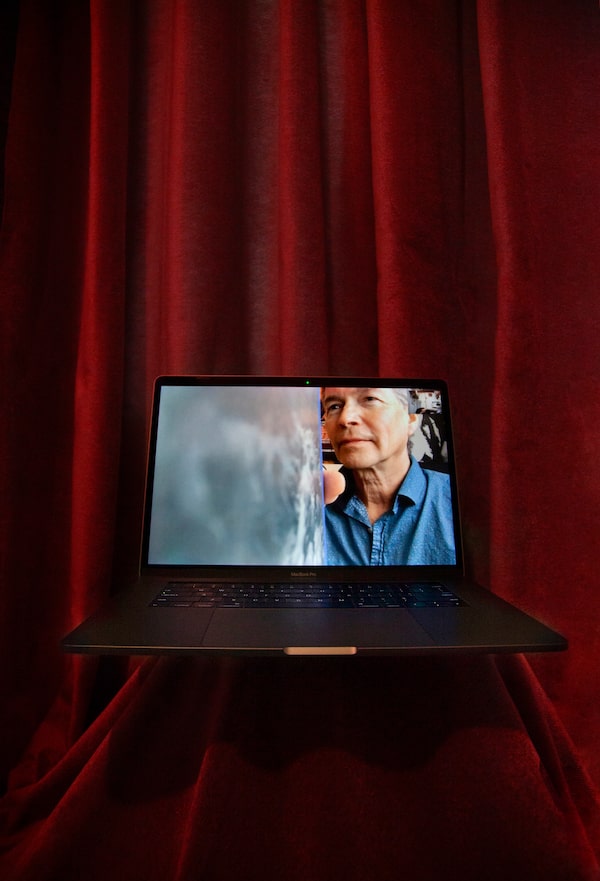
Paul Seesequasis, speaking from his home in Saskatchewan, spent months organizing an exhibition of the photographic works of Métis activist James Brady.
Paul Seesequasis
The Cree writer and cultural advocate, and creator of the Indigenous Archival Photo Project, was invited by Calgary’s Glenbow museum to curate an exhibition of James Brady’s work. Enclosing Some Snapshots: The Photography of Métis Activist James Brady was supposed to open March 21. An online version is now on the Glenbow’s website.
During the course of his four decades of activism, James Brady had his camera with him and was always taking photographs of people in the Métis and First Nations communities he visited. He was all over the place in Alberta and Saskatchewan. What I did was curate an exhibition focusing not on his activism per se, but on his photographs during those four decades. It would have been the first exhibition of his work. I spent months going through the photos – there were hundreds. The ones I selected captured his framing of Métis and First Nations communities. It’s of historical significance, but I would also say there’s really an aesthetic beauty to many of the photos. Through the later fifties and sixties, he often took the photos with the sun behind him, so you actually see his shadow in the back of the frame. His presence is there behind the camera.
When this all broke at the beginning of March, it was already pretty much set up and ready to go. And it’s still there. It’s behind a locked museum door right now, but it’s ready to go when we’re ready to go again.
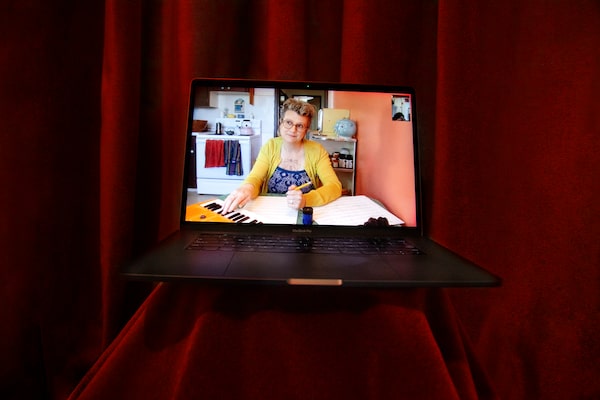
Vancouver musician and theatre artist Veda Hille had been due to take part in a German stage show about climate change when the pandemic came.
Veda Hille
In the alternate timeline, Vancouver composer/musician/theatre artist Veda Hille would have been in Dusseldorf right now, one week into a six-week stint as composer and music director for a show called Is My Microphone On?, written by Jordan Tannahill and directed by Erin Brubacher. It was supposed to have its world premiere at a festival called Theatre der Welt.
The show is a climate-change call to arms with a cast of German teenagers, so we were going over there six weeks before opening to rehearse with them. Jordan has written a play that’s essentially almost a prose poem, with a lot of references to speeches by Greta Thunberg and other young activists – attempting to take some of those styles of speeches and put them live in the mouths of living teenagers. It’s going to be an amazing show, if it ever goes up. The children essentially surround the audience and chastise them for an hour.
We’ve been doing Zoom meetings as a group three times a week, just to get to know each other in the hopes of getting to fulfill this experience next year. We had all these teenagers poised and ready to go, so we wanted to at least connect with them and see what they wanted to do. We debated doing an online show, but we decided that was directly opposed to the meaning of this show: being in a room with people and having a real conversation. So now we’re seeing whether there’s something we can do in the interim. Maybe a different piece of some kind that we can just make together, almost for ourselves.
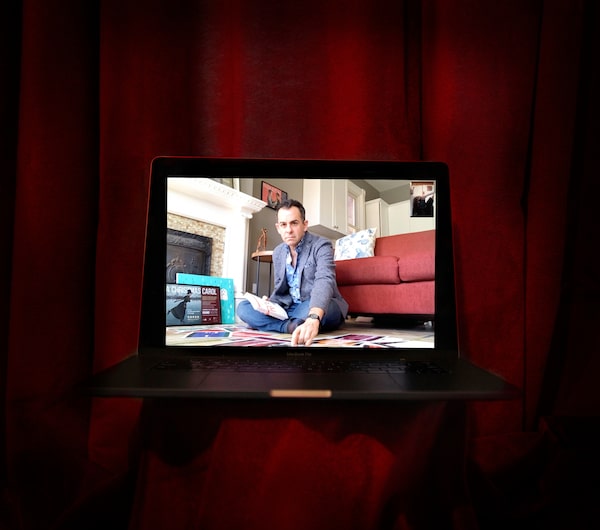
Dennis Garnhum is artistic director of the Grand Theatre in London, Ont., which was due to open the North American premiere of the play Room on March 13.
Dennis Garnhum
The final preview of the Grand Theatre’s production of Room earned a five-star review from a local critic. Written by London resident Emma Donoghue and based on her award-winning novel, the show was co-produced by Toronto’s Mirvish and Covent Gardens Productions in Britain. But the official North American premiere, set for March 13, never happened. That day, artistic director Garnhum was forced to suspend the rest of the season (which included a school-tour production called 100 Schools and a new musical, Grow), laying off 40 employees and putting 60 artists out of work. The Grand will also lose out on $1.5-million in revenue.
Room is about the endurance of a mother’s love. A woman is trapped – think about what we’re going through right now – in a room with a five-year-old boy. The plan was to rehearse and open it in London, go for a three-week run in our 800-seat theatre and then move to Mirvish in Toronto.
At the dress rehearsal, I got quietly excited. I could see this was going to be incredible. Then we had the first preview, and the audiences went crazy. They leaped to their feet. Second night: extraordinary. The third preview was the Thursday night, and they did an incredible performance, and both the producer and the director said to me, “We have a show.” Which is code for: Bring it on. After years of work, we’re ready.
And then the next morning, it was clear we had to close.
On opening day, we have a staff breakfast. So we walked in, executive director Deb Harvey and I, and we had to announce right then that we were closing Room before it opened, closing 100 Schools and that we wouldn’t proceed with Grow, the musical we’ve been working on for two years – all in one sentence. And I’m watching people sobbing as I have to keep talking.
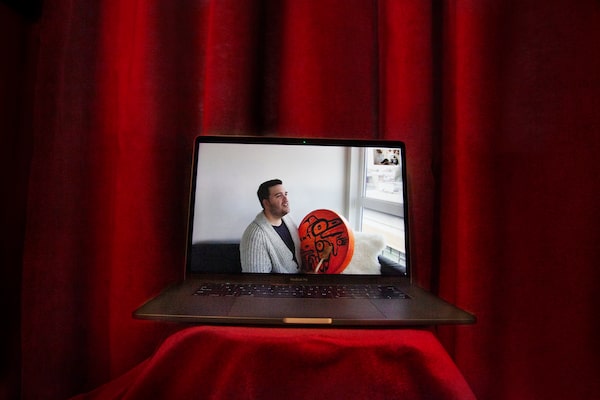
Corey Payette of Vancouver wrote the musical score for Sedna, an outdoor puppet theatre project, and was due to direct it for the Vancouver-based Indigenous theatre company Urban Ink.
Corey Payette
Urban Ink is a small Indigenous theatre company in Vancouver, and this month it was set to premiere one of its most ambitious projects to date, at Malkin Bowl in Stanley Park. Sedna was co-created by Payette, Reneltta Arluk and Marshall McMahen. It’s an epic work with a sweeping musical score composed by Payette, who is Urban Ink’s artistic director and also directed the production.
Sedna was – or is – this massive outdoor spectacle. A large-scale puppet theatre experience. We tell the stories of both Sedna, the Inuk goddess of the Arctic sea, and a young contemporary Indigenous woman who’s working as a community liaison for a pipeline project. So it’s very political, it’s very of our time and it looks at connecting with our traditional stories to help guide us today.
These puppets are magnificent lantern puppets that light up from the inside, and they represent all the sea creatures that live in the ocean and depend on us for a clean environment. We’ve been working on this show for five years now. It had a workshop production at Caravan Farm Theatre up in the middle of B.C. a year and a half ago, and this was our big premiere in Vancouver before hopefully it went off on a national tour next year. Now, with the show being postponed, 35 people are out of work.
All of us at Urban Ink are committed to realizing the production at some point. Who knows what it will end up looking like? That’s still to be determined. But I think that for everyone who has been dreaming of this production for so many years, we have to believe it will happen. This current struggle will give everyone a deeper appreciation for being together as a community and having this shared experience of theatre.
These interviews have been condensed and edited.
GOING NOWHERE WITH YOU
Joel Plaskett performed a livestream concert, hosted by The Globe and Mail's Jana Pruden and broadcast on our website, to help entertain and connect people during the pandemic. Watch the whole thing here.
Sign up for the Coronavirus Update newsletter to read the day’s essential coronavirus news, features and explainers written by Globe reporters.




 Marsha Lederman
Marsha Lederman Brad Wheeler
Brad Wheeler